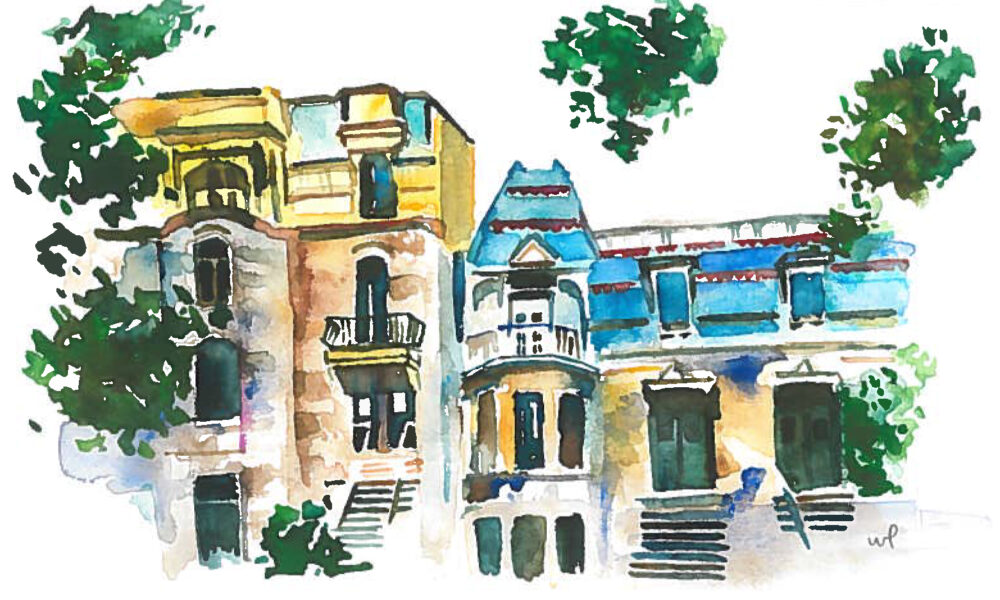Students and community organizers filed into the Students’ Society of McGill University (SSMU) Ballroom on March 21 to talk about the housing crisis in Montreal. The two-hour annual general meeting (AGM), held by the SSMU External Affairs (EA) office’s Affordable Student Housing Committee (ASHC), showcased booths from eight guest organizations and a brief presentation from Unité de travail pour l’implantation de logement étudiant (UTILE).
Members of ASHC sought to collect testimonies about students’ housing conditions, which will be compiled in a report for distribution to student media outlets, various student associations, and the student body via the SSMU listserv.
In an interview with The McGill Tribune, ASHC member William Li shared that ASHC has limited data about off-campus housing, which limits the committee’s advocacy work almost entirely to on-campus housing. ASHC recommends that McGill develop new methods and technologies to gather data about off-campus housing.
Association of McGill University Support Employees (AMUSE) team members, who represent floor fellows, were also present at the event to speak with students about housing access and equity.
In an interview with the Tribune, AMUSE president James Newman shared his frustration with McGill for raising the rent of its residences year after year. Although Quebec landlords can annually increase rent prices in accordance with the Tribunal administratif du logement’s (TAL) yearly calculations, Newman believes it’s the university’s prerogative to keep rents stable.
“It’s disheartening as a union to see our employer replicating some of the same precarity-worsening practices that we’re seeing landlords do,” Newman said. “They often say, ‘Oh we’re special, we’re an academic institution.’ But you’re replicating so many of the worst evils you see in the private sector. It’s a real shame.”
Comité logement du Plateau Mont-Royal (CLPMR) member Alain Deschamps shared how the committee can help students deal with the various abuses they may face as a vulnerable population in the housing sector. The organization helps defend tenant rights and advocates for the development of social housing. In an interview with the Tribune, Deschamps explained that tenants often hesitate to stand up for their rights against landlords due to the power dynamics at play.
“To have your rights respected, you have to sometimes take a confrontational attitude. You have to threaten […] that you’re going to take them to court,” Deschamps said. “But now you have a relationship dynamic where your landlord might get pissed off at you and they can retaliate in all sorts of stupid, annoying, petty ways.”
Other organizations present included ECOLE, a sustainable housing cooperative situated on University Street that also operates as a rentable community event space; the Concordia Student Union’s Housing and Job Resource Center, a legal support clinic that hosts workshops for students to learn skills ranging from finding their first apartment to refusing rental increases; and Syndicat de locataires autonomes de Montréal, a tenants’ union that strives to hold landlords accountable.
Other attendees included members from Comm-un and The Open Door. The Open Door provides subsidized housing options to Montreal’s unhoused community, who are often victims of the privatized housing market, exclusionary landlords, and general accessibility issues. Comm-un works in tandem with The Open Door by providing a collective space for unhoused Indigenous individuals to combat isolation and build community.
The event also hosted a brief presentation from UTILE, an organization that provides non-profit housing for students. UTILE team member Marianne Lamoure spoke about their current partnership with SSMU in which UTILE is developing an affordable student housing complex on the corner of Boulevard St. Laurent and Rue Ontario East. In an interview with the Tribune, Lamoure shared that the non-profit organization is currently waiting on approval from the city of Montreal, which could take anywhere between six months and two years.
“The lot we found, we can’t build any higher than four floors up. Our whole concept depends on density, doing a lot of apartments in one place so that each apartment can cost low, so [the approval] will take time,” Lamoure said. “We’re hoping this project will be ready by 2026.”








